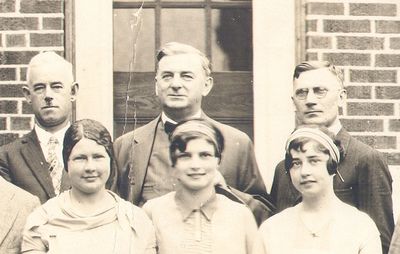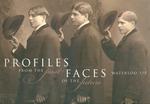William Weichel
Waterloo businessman and politician Billy Weichel was known as the
Old Warrior; his most memorable battle being the federal election of
1911 when he defeated William Lyon Mackenzie King.
Weichel defeated King, who was the labour minister in the Liberal Laurier government, by 315 votes to win Waterloo North for the Conservatives. It was believed that Weichel won on the issue of free trade with the United States. Weichel’s Conservatives opposed reciprocity at a time when Kitchener-Waterloo manufacturers and labourers feared an influx of cheap American goods.
After winning the riding, Weichel stood on the balcony of the Walper Hotel and waved to “the cheering throng that milled along King Street.” King appeared alongside Weichel on election night to shake hands and wave to the crowd while holding a small Union Jack.
The following morning, local Conservatives celebrated with a parade down King Street in a scene that was described in the local newspaper:
“Between seven and eight o’clock the streets became crowded and when the Twenty-ninth Regiment band made its appearance, it was with difficulty that the large procession proceeded toward Waterloo . . . The Berlin Tories and their supporters decided to go to Waterloo and meet the victor of the day and while they were en route they met the Waterloo band leading the delegation from that town. Mr. Weichel was serenaded at his residence and he personally came out and heartily thanked his supporters.”
Weichel held the seat until 1917 when he was defeated on the conscription issue. Weichel had represented Waterloo North during the First World War, a difficult time for German-Canadians in his riding. In 1915, Weichel rose in the House of Commons to say, “German art, German music, German science is one thing; but Prussian militarism is another, and the reason why so many people of German origin have left their old fatherland was to escape military domination.” As tensions grew, Weichel rose again in 1917 to say that his constituents supported the old Germany of Beethoven and Schubert not the Germany of Kaiser Wilhelm.
Weichel, who had served as a Waterloo alderman for three years and as Waterloo’s mayor before entering the federal fray, returned to the municipal realm after being defeated in 1917. He ran for council again in 1922 and served as mayor until 1923.
That same year he ran in the provincial riding of Waterloo for the Conservatives and was elected. He was in and out of the provincial arena before retiring in 1934 after losing a provincial campaign.
Weichel’s prominence in politics was matched by his business success locally. After working as a clerk in his father’s hardware store in Elmira from 1883 until 1890, the family eventually opened a Waterloo store called M. Weichel and Sons Hardware in 1896. Billy Weichel eventually assumed ownership and renamed it Weichel Hardware.
When he died in 1949, his obituary read, “Mr. Weichel did much in his time to advance the best interests of this community, which he served with sincerity and distinction. His entire business and political careers centred in Waterloo County, where he was intimately known.”
Photo courtesy of the Waterloo Public Library
William Weichel (Waterloo 150 Profile)
Description
- Creator
- Gallagher, Beth, Author
- Media Type
- Text
- Image
- Description
- To celebrate Waterloo's 150th anniversary, the Waterloo Public Library published a book called "Profiles from the Past, Faces of the Future." This book featured 150 profiles of people who helped make Waterloo what it is today. This is the digitized profile for William Weichel.
- Notes
- Please visit the Waterloo Public Library to enquire about physical copies of "Profiles from the Past, Faces of the Future."
The Waterloo 150 project was funded by a grant from the Waterloo Regional Heritage Foundation. Beth Gallagher wrote the profiles with the assistance of many research volunteers. Information for the profiles was gathered from a variety of sources from the community and the Ellis Little Local History Room. Notable sources include the Ellis Little Papers, newspaper clippings, local magazines and books.
William Weichel is the man in the middle of the photo. - Place of Publication
- Waterloo, Ontario
- Date of Publication
- 2007
- Subject(s)
- Personal Name(s)
- Weichel, William ; King, William Lyon MacKenzie
- Corporate Name(s)
- M. Weichel and Sons Hardware ; Weichel Hardware
- Language of Item
- English
- Geographic Coverage
-
-
Ontario, Canada
Latitude: 43.4668 Longitude: -80.51639
-
- Copyright Statement
- Uses other than research or private study require the permission of the rightsholder(s). Responsibility for obtaining permissions and for any use rests exclusively with the user.
- Contact
- Waterloo Public LibraryEmail:askus@wpl.ca
Website:
Agency street/mail address:35 Albert Street, Waterloo, Ontario, Canada, N2L 5E2
- Full Text




